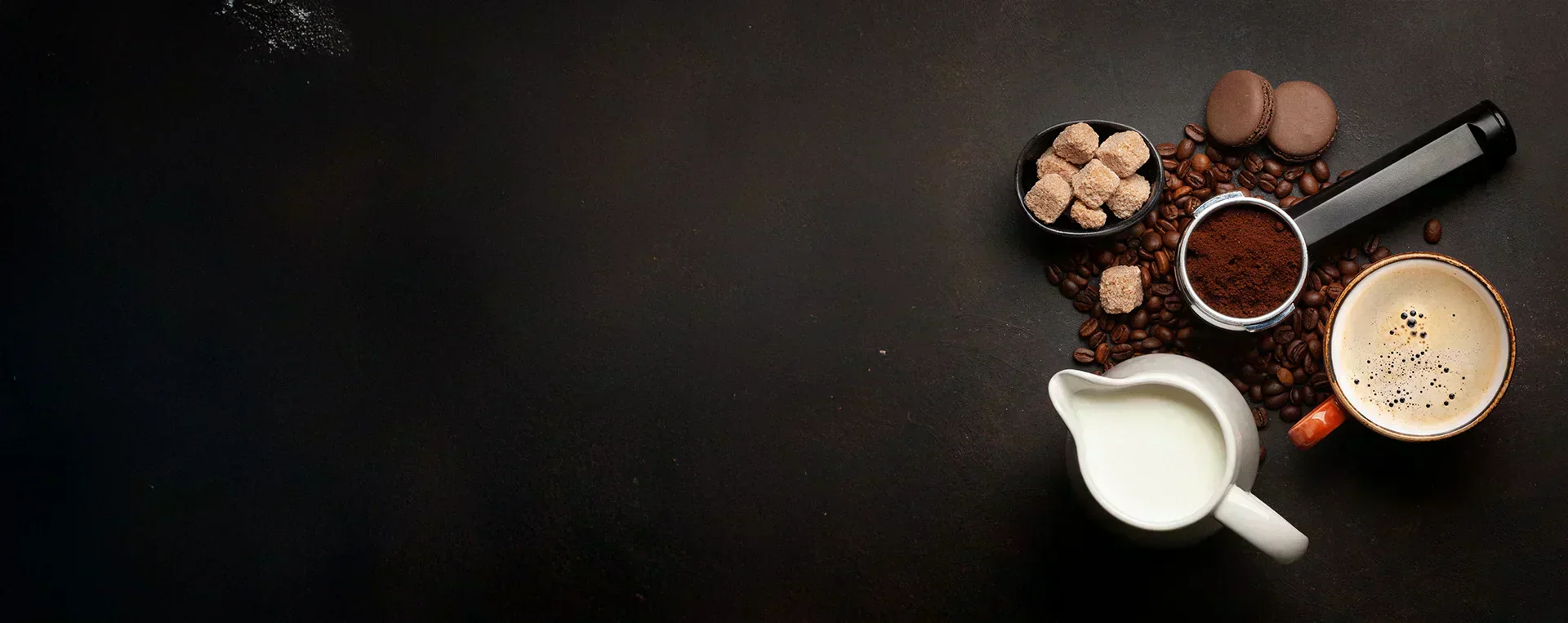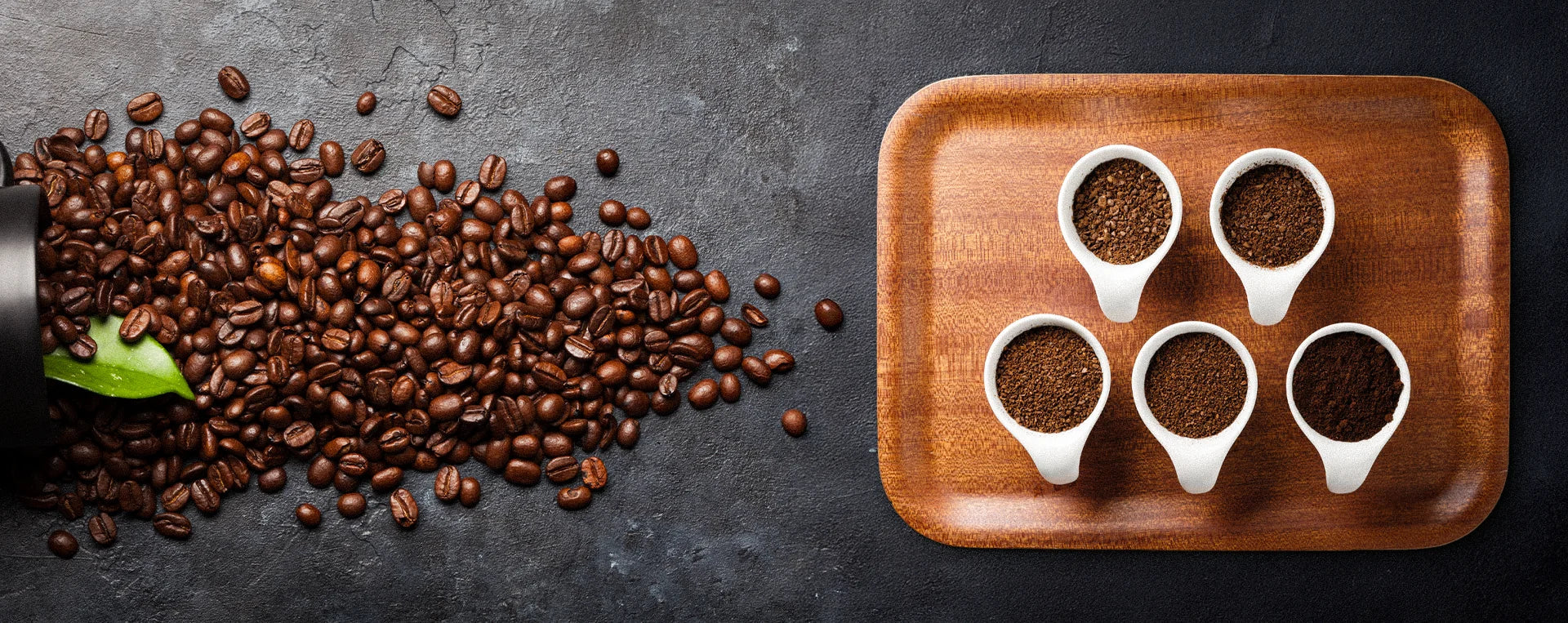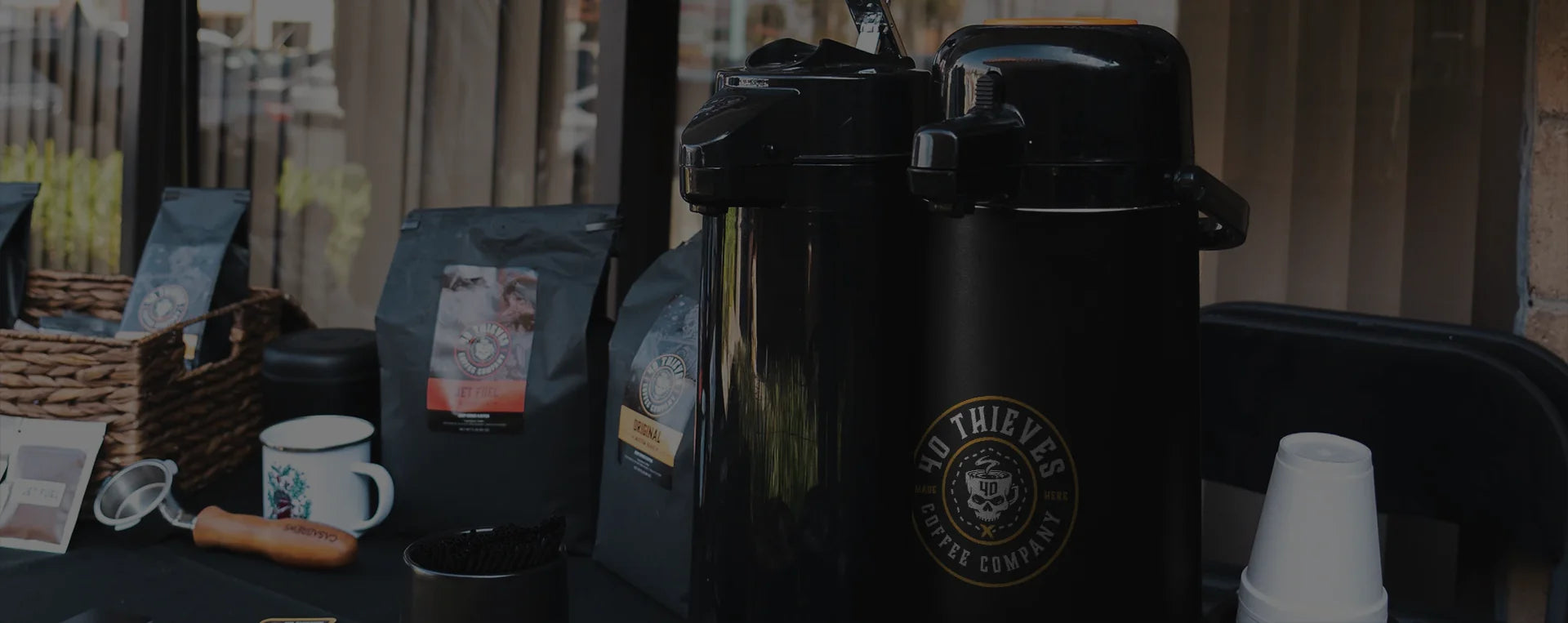
French Roast Coffee: The Classic Dark Roast Perfected
By the French Roast Masters at 40 Thieves Coffee | Updated June 2025
French roast coffee represents the pinnacle of dark roasting tradition—bold without bitterness, smoky without harshness, and complex despite its deep development. This classic roast style transforms quality beans into liquid velvet that delivers satisfaction with every sip.
French roast coffee commands respect in the coffee world as the gold standard of dark roasts. Unlike commercial dark roasts that burn beans to mask defects, authentic French roast coffee requires exceptional skill to develop deep, rich flavors while maintaining structural integrity and avoiding bitter char.
Working daily with our roasting partners in Temecula, CA, we witness the precision required to perfect French roast coffee. The margin between excellence and failure narrows dramatically at these temperatures—too little development leaves the roast incomplete, too much creates ash instead of coffee.
What Is French Roast Coffee? The Art of Deep Development
French roast coffee emerges when master roasters push beans deep into second crack territory while preserving the essential characteristics that separate quality coffee from burnt offerings. This roast level demands exceptional bean selection and roasting expertise.
French Roast Coffee Technical Profile:
- Roasting Temperature: 464-480°F (240-249°C), deep into second crack
- Development Time: Extended post-crack development for flavor complexity
- Bean Appearance: Very dark brown to nearly black with pronounced oil development
- Oil Migration: Surface oils create the signature glossy sheen of French roast coffee
- Structural Changes: Cell walls break down, creating the characteristic crack and expansion
- Flavor Development: Deep caramelization and Maillard reactions create complex taste profiles
The French Roast Coffee Heritage
French roast coffee originated from 19th-century European coffee culture, where roasters developed techniques to create bold, satisfying coffee that could stand up to the robust flavors of traditional European cuisine. The name reflects the French appreciation for deep, developed flavors in both food and coffee.
True French roast coffee maintains the balance that defined the original style—bold intensity without sacrificing drinkability, smoky character without overwhelming bitterness.
Real-World French Roast Coffee Mastery: Lessons from Our Roasting Partnership
Perfecting French roast coffee presents unique challenges that reveal themselves only through hands-on experience. Our collaboration with Temecula roasting partners provides daily insights into what separates exceptional French roast coffee from mediocre attempts.
The Central American Lot That Redefined Our Approach
Recent work with a high-grown Central American lot challenged our French roast coffee assumptions. Despite excellent green coffee quality, initial batches produced harsh, one-dimensional results that lacked the complexity we expect.
Our Temecula roasting team discovered this particular lot required a completely different heat application curve. Instead of aggressive temperature ramping typical for French roast coffee, these beans demanded gradual development to preserve their inherent sweetness while achieving proper darkness.
What We Learned: Even within French roast coffee parameters, each origin requires individual attention. Generic dark roast profiles fail with specialty beans that deserve better treatment.
The Oil Development Discovery
Customers occasionally ask why some French roast coffee beans appear more oily than others. Our investigation revealed that oil development timing varies significantly based on bean density, processing method, and storage conditions.
Working with our roasting partners, we learned that optimal French roast coffee oil development occurs during the final 30-60 seconds of roasting. Earlier oil emergence indicates potential defects, while delayed appearance suggests insufficient development.
What We Learned: French roast coffee oil patterns provide crucial quality indicators that help us maintain consistency across batches.
Brewing Method Feedback Revolution
Customer feedback revealed that our original French roast coffee formulation worked excellently for espresso but created muddy results in drip brewing. Rather than accept this limitation, we collaborated with our Temecula partners to develop a more versatile profile.
The solution involved adjusting final development to maintain espresso-worthy body while preserving enough structure for clean drip brewing. This required testing across fifteen different batches to perfect the balance.
What We Learned: Great French roast coffee should excel across multiple brewing methods, not just one specialized application.
French Roast Coffee Flavor Profile: Bold Complexity
French roast coffee delivers flavor experiences impossible to achieve with lighter roasts. The extended development creates entirely new taste compounds while transforming others, resulting in the rich, satisfying character that defines this classic style.
French Roast Coffee Flavor Development:
- Primary Notes: Bold chocolate, caramelized sugar, smoky depth
- Secondary Characteristics: Dark fruit richness, roasted nut complexity
- Structural Elements: Full body, low acidity, smooth mouthfeel
- Finish: Clean conclusion with lingering chocolate and caramel
- Oil Contribution: Surface oils add richness and textural depth
- Roast Character: Developed smokiness without harsh edges
The key to exceptional French roast coffee lies in balancing roast development with origin preservation. While the roasting process dominates the flavor profile, quality beans still contribute underlying complexity that separates great French roast coffee from burnt substitutes.
French Roast Coffee vs Other Dark Roast Styles
French roast coffee occupies a specific position within the dark roast spectrum. Comparing it to other styles reveals the precise characteristics that make French roast coffee distinctive.
French Roast Coffee
Temperature: 464-480°F
Character: Bold, balanced, complex
Oil Level: Moderate surface oils
Best Use: Versatile brewing
Italian Roast
Temperature: 480-520°F
Character: Intense, sharp, carbonized
Oil Level: Heavy oil development
Best Use: Espresso only
Spanish Roast
Temperature: 450-470°F
Character: Smoky, sweet, approachable
Oil Level: Light oil appearance
Best Use: Traditional brewing
Why French Roast Coffee Maintains Superiority
French roast coffee achieves the optimal balance point among dark roast styles. It delivers more complexity than lighter dark roasts while avoiding the harsh carbonization that plagues extremely dark styles like Italian roast.
Optimal Brewing Methods for French Roast Coffee
French roast coffee rewards brewing methods that complement its full body and rich oil content. Different techniques extract varying characteristics from French roast coffee, allowing customization based on preference and occasion.
Drip Coffee - Classic French Roast Coffee Experience
- Why it Works: Highlights French roast coffee's bold character while maintaining clean finish
- Grind Size: Medium (like kosher salt)
- Water Temperature: 195-200°F to prevent over-extraction
- Brewing Ratio: 1:15 to 1:17 (coffee to water)
- Result: Full-bodied French roast coffee with balanced complexity
French Press - Maximum French Roast Coffee Richness
- Why it Works: Preserves oils that contribute to French roast coffee's signature mouthfeel
- Grind Size: Coarse (like sea salt)
- Steeping Time: 4 minutes for optimal extraction
- Temperature: 200°F for full flavor development
- Result: Rich, syrupy French roast coffee with maximum body
Espresso - Concentrated French Roast Coffee Power
- Why it Works: French roast coffee's oils create excellent crema while flavors cut through milk
- Grind Size: Fine (table salt consistency)
- Extraction Time: 25-30 seconds
- Pressure: 9 bars for optimal extraction
- Result: Intense French roast coffee shots perfect for milk drinks
French Heist: Premium French Roast Coffee Excellence
At 40 Thieves Coffee, we craft French roast coffee that honors the traditional style while incorporating modern precision. Our signature French roast demonstrates everything this classic roast level can achieve.
French Heist: Traditional French Roast Coffee Perfection
Our flagship French roast coffee built from high-grown, fully washed coffees across Central America. French Heist proves that French roast coffee can deliver boldness without bitterness and complexity without compromise.
French Heist Origin Profile:
Central American Foundation: Sourced from 1,000-2,000 meters elevation, these fully washed beans provide the structural integrity needed for proper French roast coffee development. They contribute creamy body, cocoa richness, and subtle dark fruit characteristics.
High-Altitude Advantage: Higher elevation beans maintain lively acidity even through French roast development, creating the balance that distinguishes quality French roast coffee from flat, commercial alternatives.
French Heist Flavor Profile:
- Core Character: Bold chocolate foundation with caramelized sweetness
- Complexity Layers: Dark fruit richness, smoky depth, citrus hints
- Body Structure: Full, creamy mouthfeel with syrupy sweetness
- Acidity Balance: Medium acidity that brightens rather than overwhelms
- Finish Quality: Clean, crisp conclusion without bitter aftertaste
- Versatility: Excellent for drip, French press, and milk-based drinks
Why French Heist Represents Superior French Roast Coffee:
This French roast coffee demonstrates how proper bean selection and roasting technique create complexity within the classic profile. The Central American foundation provides the strength needed for deep roasting while maintaining the clarity and balance that separate great French roast coffee from burnt substitutes. Roasted to order by our Temecula partners for peak freshness.
French Roast Coffee Health Considerations
French roast coffee provides specific health characteristics due to the extended roasting process that creates beneficial compounds while reducing others.
- Reduced Acidity: Extended roasting breaks down chlorogenic acids, making French roast coffee gentler on sensitive stomachs
- Antioxidant Development: Roasting creates melanoidins with anti-inflammatory properties
- Lower Caffeine: Heat reduces caffeine content to approximately 80-85mg per 8oz cup
- Digestive Comfort: Lower acid levels reduce gastric irritation compared to lighter roasts
- Heart Health: Moderate consumption may support cardiovascular wellness
- Metabolic Benefits: Coffee compounds may enhance metabolic function
Frequently Asked Questions About French Roast Coffee
What makes French roast coffee different from other dark roasts?
French roast coffee achieves the optimal balance point among dark roast styles, roasted to 464-480°F for bold flavor without harsh bitterness. It maintains more complexity than extremely dark roasts like Italian while delivering fuller body than lighter dark roast styles.
Does French roast coffee have less caffeine?
French roast coffee contains slightly less caffeine (80-85mg per 8oz) than lighter roasts due to caffeine breakdown during extended roasting. However, the difference is minimal and won't significantly impact energy levels for most coffee drinkers.
Why do French roast coffee beans look oily?
French roast coffee beans develop surface oils because extended roasting time draws natural oils from inside the bean to the surface. This oil development contributes to the rich mouthfeel and glossy appearance that characterizes quality French roast coffee.
Is French roast coffee stronger than regular coffee?
French roast coffee delivers stronger flavor intensity due to deep roasting that creates bold, smoky characteristics. While caffeine content is slightly lower than lighter roasts, the perceived strength comes from flavor concentration rather than stimulant power.
What's the best way to brew French roast coffee?
French roast coffee excels with drip coffee methods, French press, and espresso brewing. Use medium to coarse grinds, water temperature between 195-200°F, and standard coffee-to-water ratios. The oils in French roast coffee benefit from brewing methods that don't filter them out.
Can I use French roast coffee for cold brew?
French roast coffee creates excellent cold brew concentrate with smooth, chocolatey characteristics and minimal bitterness. Use coarse grind and 12-24 hour steeping time. The low acidity of French roast coffee produces naturally smooth cold brew results.
How should I store French roast coffee?
Store French roast coffee in airtight containers away from light, heat, and moisture. The surface oils make French roast coffee slightly more susceptible to rancidity, so purchase quantities you'll consume within 2-3 weeks of the roast date.
What foods pair well with French roast coffee?
French roast coffee pairs excellently with rich desserts like dark chocolate, tiramisu, and caramel-based sweets. The bold flavors also complement hearty breakfast foods, grilled meats, and aged cheeses that can match its intensity.
French Roast Coffee: The Timeless Classic
French roast coffee represents more than just a roasting technique—it embodies a philosophy of bold satisfaction that refuses to compromise. When executed properly, French roast coffee delivers the full-bodied richness and smoky complexity that have made it a coffeehouse staple for generations.
Understanding French roast coffee means appreciating the skill required to balance intensity with drinkability, depth with clarity, and tradition with modern precision. Every cup represents the culmination of careful bean selection, expert roasting, and respect for the classic profile.
When you choose French Heist or any quality French roast coffee, you're choosing a coffee tradition that has satisfied demanding palates for over a century. You're choosing boldness with balance, intensity with integrity, and satisfaction with every sip.
That's our coffee promise. That's what makes it a great dark roast coffee.
Sources and References
This French roast coffee guide draws from roasting science research, traditional coffee preparation methods, and our direct experience with professional roasters in Temecula, CA. All information is verified through credible coffee industry sources and peer-reviewed studies.
- National Coffee Association USA. (2024). "French Roast Coffee Standards and Characteristics." https://www.ncausa.org/About-Coffee/Coffee-Roasts
- Specialty Coffee Association. (2023). "Dark Roast Development: French Roast Protocols and Quality Standards." https://sca.coffee/research/protocols-best-practices
- Real Simple Magazine. (2024). "The Coffee Roasting Guide: Understanding French Roast Development." https://www.realsimple.com/food-recipes/shopping-storing/beverages/coffee-roast-guide
- Corner Coffee Store. (2023). "Coffee Roast Levels Explained: French Roast Characteristics and Brewing." https://cornercoffeestore.com/types-of-coffee-roasts/
- Procaffeination. (2024). "Guide to Coffee Roasting Temperatures: French Roast Development Analysis." https://procaffeination.com/guide-to-coffee-roasting-levels-with-charts-info-before-you-buy/
- Coffee Quality Institute. (2023). "Dark Roast Evaluation Standards for French Roast Coffee." https://www.coffeeinstitute.org/our-work/the-q-coffee-system/
- Perfect Daily Grind. (2024). "French Roast Coffee: History, Development, and Modern Applications." https://perfectdailygrind.com/
- International Coffee Organization. (2024). "Global Coffee Roasting Standards and French Roast Classification." https://ico.org/trade_statistics.asp
- Journal of Food Science. (2022). "Chemical Changes During French Roast Development and Flavor Impact." Volume 87, Issue 6, Pages 2456-2467. DOI: 10.1111/1750-3841.16178
- Barista Hustle. (2024). "French Roast Brewing Optimization: Extraction Techniques and Parameters." https://www.baristahustle.com/
- World Coffee Research. (2023). "Impact of Extreme Roasting on Coffee Quality: French Roast Analysis." https://varieties.worldcoffeeresearch.org/
- Food Research International. (2022). "Antioxidant Activity and Health Benefits of French Roast Coffee." Volume 156, Article 110631. DOI: 10.1016/j.foodres.2022.110631
Disclaimer: Individual coffee preferences and health responses vary. The health benefits mentioned are based on general research and may not apply to all individuals. Consult healthcare providers regarding caffeine consumption if you have specific health concerns, especially cardiovascular conditions or caffeine sensitivity. French roast coffee's bold flavors may not suit all taste preferences.



Leave a comment
This site is protected by hCaptcha and the hCaptcha Privacy Policy and Terms of Service apply.